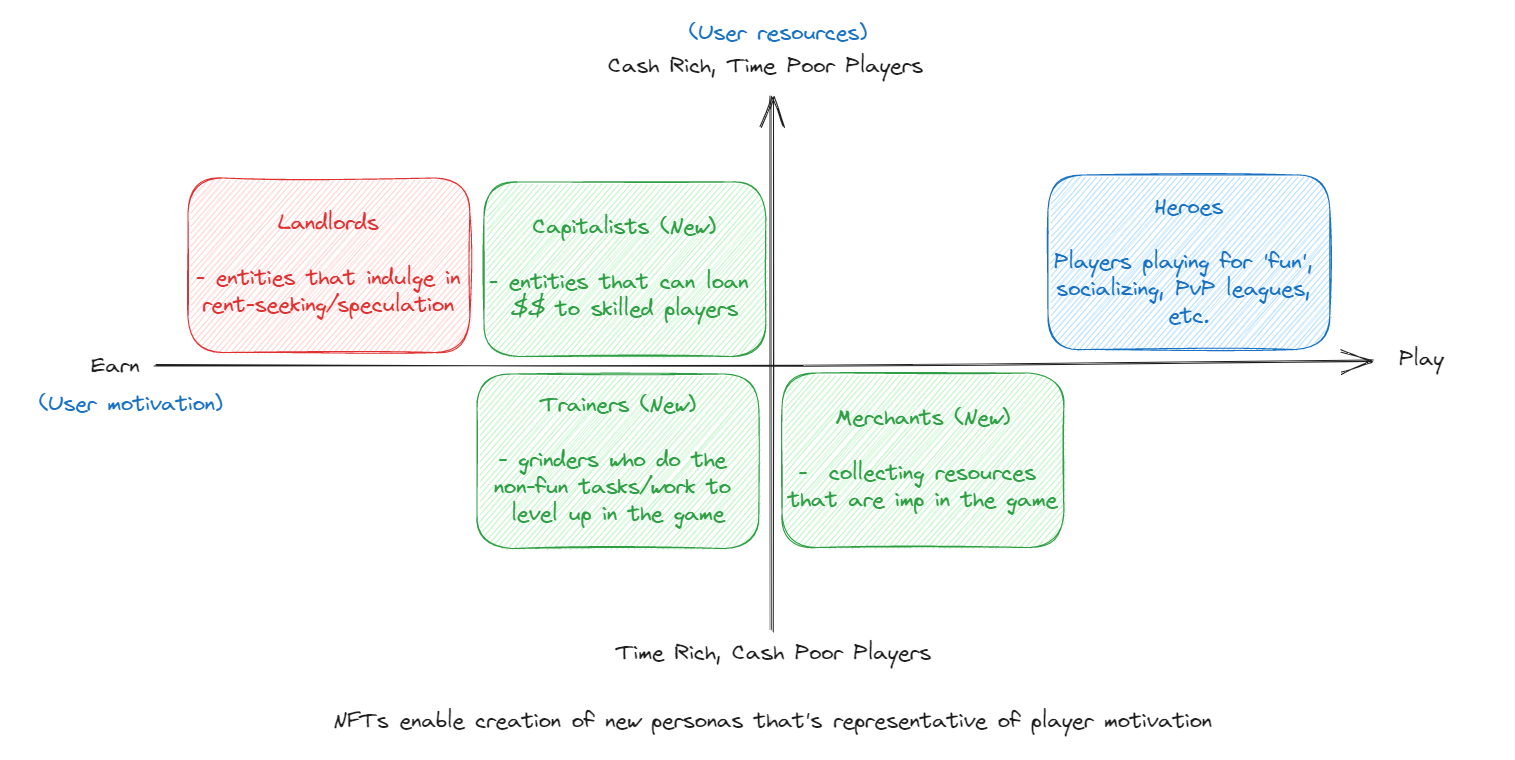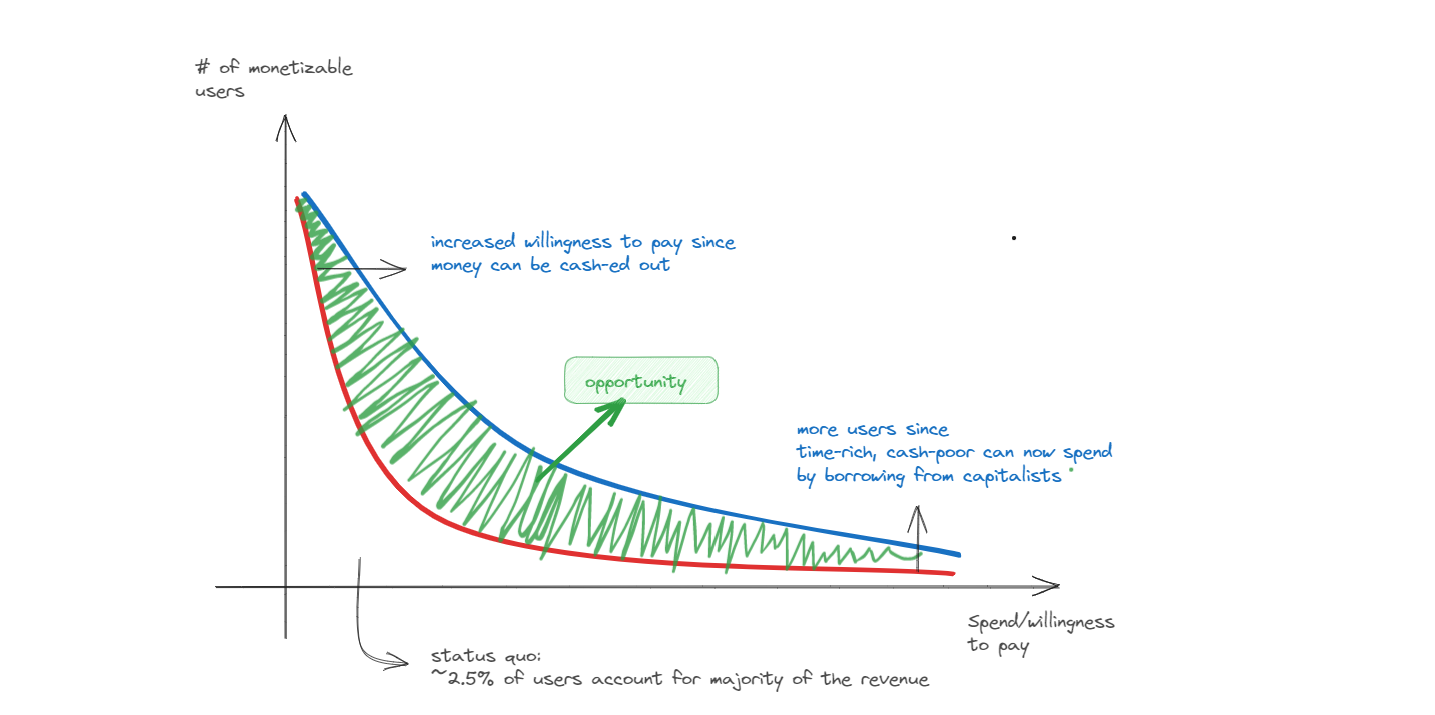The Case For Blockchain In Gaming
Why Use Blockchain in Gaming?
Free-to-play games currently monetize their user base primarily by selling in-game assets. However, only about 2% of players drive the majority of the revenue earned by the game developers. When the game starts to mature, this creates a conflict for free-to-play game developers as game design choices made in the interests of ‘paying players’ is against the interests of ‘non-playing players.’ As a result, we see the emergence of a ‘pay-to-win’ dynamic, which is detrimental to the overall game experience and reduces the shelf-life of the game itself. On the other hand, not choosing to address the problems of ‘paying players’ makes the game developer dependent on publishers for their primary source of revenue, which results in publishers capturing the majority of the value created by the game. Free-to-play game developers, therefore, have to deal with this dilemma that's inherent to their business model - especially when the game starts to mature.
Blockchain technology offers a way out of this catch-22 situation. Through ownership primitives such as Non-Fungible Tokens (NFTs), developers can separate the role of 'players' based on their motivations of 'owning assets in the game' and 'playing in the game'. This separation enables a new design space where multiple personas can be created and 'pay-to-win' dynamics can be averted using game design. Blockchain technology thus enables new forms of game play, and in turn, creates new opportunities for game developers to earn additional sources of income.
Blockchain technology offers a way out of this catch-22 situation. Through ownership primitives such as Non-Fungible Tokens (NFTs), developers can separate the role of 'players' based on their motivations of 'owning assets in the game' and 'playing in the game'. This separation enables a new design space where multiple personas can be created and 'pay-to-win' dynamics can be averted using game design. Blockchain technology thus enables new forms of game play, and in turn, creates new opportunities for game developers to earn additional sources of income.

Apart from addressing the game-design problem, there are other effects of using blockchain in gaming. We examine the first and second order effects below in greater detail below and then end with certain open questions faced by the industry.
Increasing the Size of the Game Economies

Using blockchain in games has the potential to increase the size of the game economy. This first-order effect hinges on two assumptions:
- New types of user personas will start playing the game and spending money inside the game
- Heroes are primary user personas. They play for fun, socialize, and compete in leagues.
- Merchants are secondary user personas who gather resources that are useful for Heroes.
- Trainers are tertiary user personas who do the grunt work for Heroes and Merchants.
- Capitalists are tertiary user personas who provide resources to any of the above users for a fee.
- Players will have higher willingess to play and will spend more now
- Money spent can now be recovered by sale of assets unlike before.
- Interoperability results in increased utility since assets bought can have value outside of games.
Better Monetization, Engaged Community, and Interoperability
Using blockchain in gaming has an effect on the game economies that is similar to opening up a real-world economy that was closed before and centrally-managed. In the process, game developers cede some control of the game to the player community. This results in various second-order effects. Some of the major ones are:
- Lesser dependence on publishers and distributors
- developers can create new forms of monetization mechanisms by legitimizing various forms of player-to-player transactions and levying taxes on them.
- developers can create in-game tokens that incentivizes player behavior to spread the word, driving organic adoption without need for big marketing spend.
- Increased engagement of the overall community
- enabling more players result in better player-skill matching experience, better competition, better leagues, etc.
- incentivising user-generated-content with in-game tokens such as videos, modding of games, etc. can reult in creation of interesting content as well as player experiences.
- Enabling creation of an open metaverse with neutral foundations
- Blockchain technlogy can enable interoperable universes where assets purchased in one universe can still retain its value in other universe. Today when you purchase a sport jersey, it doesnt matter if you visit the 49ers stadium or the Warriors stadium, your jersey will still its value and you can signal what you want with that jersey. That is not the case today in digital worlds.
- Likewsie, by enabling a neutral payments foundtion, blockchain can help companies and entities with different and competing strategies co-ordinate and build towards a shared future of the internet.
Building the Metaverse is a bit tricky and most futuristic of all- partly becuase the word itself means different thing to different people. It is the convergence of a lot of different technologies (AR/VR, Blockchain, AI, Digital Twins, All-the-other-tech-buzzwords :P, etc.) and industries (media and entertainment, remote work, etc.) and that's what makes it tricky. Matthew Ball's Metaverse Primer does a good job of creating a shared language to talk about the different opportunities and challenges that we are likely to encounter along the way.
Ultimately, building the future comes down to coordinating efforts of a large group of people. Blockchain is one such tool for mass co-ordination. Like any tool it has its pros and cons. There are many challenges that the industry has to figure out before the Metaverse vision comes close to be realized. The tech is far from perfect. But, what matters is not whether the blockchain is technically superior in a given way, especially compared to its current, point-in-time alternatives. Rather, it’s whether blockchain standards can more effectively enhance developer profits over time, and in turn, grow the Metaverse economy.
Ultimately, building the future comes down to coordinating efforts of a large group of people. Blockchain is one such tool for mass co-ordination. Like any tool it has its pros and cons. There are many challenges that the industry has to figure out before the Metaverse vision comes close to be realized. The tech is far from perfect. But, what matters is not whether the blockchain is technically superior in a given way, especially compared to its current, point-in-time alternatives. Rather, it’s whether blockchain standards can more effectively enhance developer profits over time, and in turn, grow the Metaverse economy.